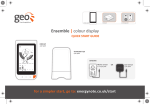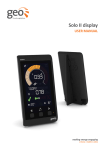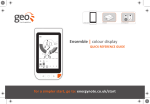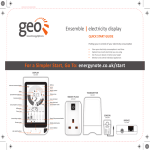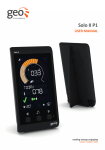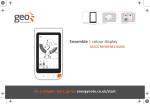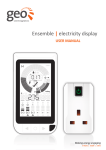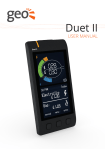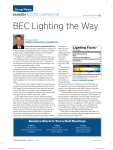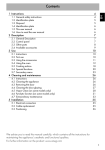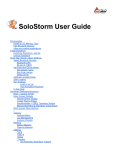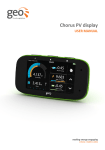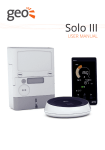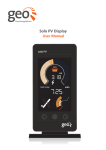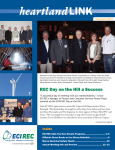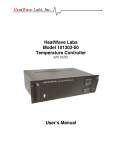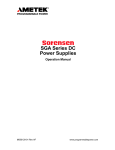Download Solo II LED: Microgeneration
Transcript
Solo II LED: Microgeneration USER MANUAL Solo II LED: Microgeneration 1 Contents Welcome Safety information What’s in the box? Solo II LED: Microgeneration • Setting up • Advanced configuration PV array kW Currency Temperature units Generation meter Sleep mode Week start • Basic configuration Time and date Feed-in tariff Temperature set-point Internet bridge Display overview Reading your display • Icons • Speedometer • Upper numbers • Lower numbers • Microgeneration threshold • Temperature • LED indicator • Changing units • Viewing your history • Energy stopwatch • Pairing • Transmitter • Temperature sensors • Bridge Energynote online service FAQs Technical information Legal information 2 3 3 4 5 9 10 11 16 17 18 18 Solo II LED: Microgeneration Welcome to geo’s energy management service. You’ll find everything you need here to gain visibility and control of your microgeneration. Your new Solo II will help you manage, regulate and visualise your energy use – supporting you as you learn more and more about energy efficiency. In this guide you’ll find everything you need to quickly and simply set up and start using your display. You’ll also find more information about how the monitor works and how it can help you. In microgeneration mode you can identify the best times to use heavy-load appliances (such as your washing machine or tumble dryer). Microgeneration and consumption modes The Solo II can measure either consumption (default) or microgeneration – but not at the same time. Please note that when you have chosen either of these modes then it is not advisable to switch to the other. If you do, you will lose the data you have been collecting (from whichever mode you had previously set up). If you choose to switch modes, the display will reset to day one. SAFETY INFORMATION Keep the display away from water Clean with a soft, dry cloth If any of the components appear damaged, contact us This is a self-installing display. There is no need for you to connect or disconnect any cabling – and you won’t need access to your electricity meter Do not fit rechargeable batteries To protect the environment, please take your batteries to a recycling centre for safe disposal You will also have access to energynote, our online energy management service that presents all your data in greater detail. There is no limit to the amount of data you can upload. See, analyse and explore for years to come. For use in a dry, indoor environment only Please only use the power supply provided This product is RoHS compliant and CE approved You should find everything you need in this guide, but if you don’t, get in touch and we’ll be happy to help. Solo II LED: Microgeneration 3 What’s in the box? Power supply x 2 Transmitter (batteries included) LED sensor and Velcro Solo II display Display stand Internet bridge Ethernet cable 4 Solo II LED: Microgeneration Solo II LED: Microgeneration Setting up Please note: by choosing [MICRO-GEN] mode, you will not be collecting data for [CONSUMPTION] mode. If you choose to switch modes you will lose all data you have collected as the display will reset to day one. 3. The pulse output is a flashing red light on the front of your generation meter. Stick the square Velcro around the pulse output. Imp/kWh 1. Plug the power supply into the display. Your display will turn on automatically when you plug it into the mains supply. Whenever the display is turned on, you will see the [SET CLOCK] screen. 4. Place the LED sensor over the square Velcro on the meter ensuring that the geo logo is facing you. 5. Plug the LED sensor cable firmly into the socket in the bottom of the transmitter. Use the and buttons on the front of the display to adjust the time and date – then press the centre button ( ) when you have finished. 2. Open the transmitter and remove the battery tab. battery tab Solo II LED: Microgeneration 5 Microgeneration mode Your Solo II’s default mode calculates energy consumption. In order to set it up for microgeneration you’ll need to change the mode. Press and hold the centre button for three seconds to enter the settings menus. Press to select [ADVANCED] and press the centre button to confirm. Press again to select [MICRO-GEN] then press the centre button to confirm. Advanced configuration Currency Using the and buttons select your currency and press the centre button to confirm. Temperature units You are now in the Advanced menu which has the following settings: • • • • • • • [PV ARRAY KW] [CURRENCY] [TEMPERATURE UNITS] [PULSE] [DISPLAY OFF] [DISPLAY ON] [WEEK START] PV array (kW) Select whether you want the temperature to be shown in centigrade (°C) or farenheit (°F). Using the and buttons select °C or °F and press the centre button to confirm. Set the PV array size to best match your installation. Simply round up the actual size of your PV installation to either 2, 4, 6, 8 or 20kW. 6 Solo II LED: Microgeneration Generation meter Week start You need to tell the display about your generation meter. The display works by detecting the LED flashing on the meter, but it needs to be told how many times the pulse flashes per kWh of energy generated. This is normally written on the front of your meter, e.g. ‘1000 imp/kWh’. Set your preferred day for the start of the week. This is used by the display when showing the energy generated for the [LAST WEEK] and [THIS WEEK]. Using the and buttons enter the value for imp/kWh from your meter and press the centre button to confirm. and buttons select your Using the preferred day and press the centre button to confirm. Basic configuration Sleep mode The sleep mode allows you to tell the display to turn the backlight off overnight. This is done by entering the [DISPLAY OFF] time and the [DISPLAY ON] time. During this time the backlight of the display will be turned off – if you want to see the display whilst it is asleep simply press any button and it will wake up for 60 seconds. If you set a [DISPLAY OFF] time, you will then need to set the [DISPLAY ON] time again using the and buttons and then press the centre button to confirm. Press and hold the centre button for three seconds to enter configuration mode then and to choose [BASIC] mode press and press the centre button to select [BASIC] settings. You will be asked to set the following: • • • • • • [SET TIME] [SET YEAR] [SET MONTH] [SET DAY] [FIT] [SET-POINT] If you don’t want to use the sleep mode then you can set it to OFF. Using the and buttons set the [DISPLAY OFF] time to OFF then press the centre button to confirm. Solo II LED: Microgeneration 7 Time and date Temperature - set point If you’ve already set the time and date then press the centre button to confirm all. If you need to set the time and date then use and to adjust the time and date accordingly. Press the centre button to confirm. Feed-in tariff [FiT] The display can tell you if your home is running warmer or cooler than your ideal temperature. and buttons to set the Use the temperature and press the centre button to confirm. The feed-in tariff is the price you are paid for the energy you generate. You can find that on your electricity bill. It’s usually shown per kilowatt. e.g. Feed-in tariff = £0.20/kW 8 Solo II LED: Microgeneration Internet bridge The Solo II pack comes with a bridge. The bridge connects wirelessly to your display and to the internet via an Ethernet connection to your broadband router. This lets you connect your Solo II to the internet and access our online energy service, energynote. Here you’ll find live information, data storage and in depth analysis. You can also monitor your home and control appliances remotely via your online account or your mobile phone. Setting up 1. Select the correct set of pins. Insert and twist clockwise to clip the pins to the power supply. Plug the power supply into a mains socket and insert the other end into the internet bridge. Cloud not lit If it isn’t lit either your display is out of range of the bridge or it’s not paired correctly. Press and at the same time for a few seconds to enter pairing mode: the display will show [PAIRING MODE] for a second then show [MAIN SENSOR]. Press twice to get to [BRIDGE]. If the unit is paired it will show [CONN] and the signal strength will be shown by the signal strength icon at the top left of the display. This will be flashing if it is out of range: move the display closer to the bridge until you get a signal. If the unit is not connected go to the Pairing section (page 13) to see how to pair the bridge. Cloud lit but flashing If the cloud icon is flashing it’s because your display is paired to the bridge but the bridge is not connected to the internet. Check that your router is switched on and that you have an internet connection. 2. Using the Ethernet cable provided, connect the internet bridge to your broadband router. 3. You’ll be able to tell if the display is paired correctly as the cloud icon will be lit (top left of the display ). 4. Go to www.energynote.co.uk to log in or, if it is your first visit, to set up an account. The website will take you through this process step by step. Solo II LED: Microgeneration 9 Display overview Cloud Repeater Signal strength Rewards Speedometer Cost unit Power unit Text Currencies Lower digits Primary temp. Heatwave and snowflake Battery Message Upper digits Energy Carbon cloud unit Carbon Solar threshold Secondary temp. LED indicator Right button Left button Centre button 10 Solo II LED: Microgeneration Reading your display Icons Signal strength The signal strength icon shows the quality of the radio connection to the transmitter. If is flashing the communication is intermittent. Try moving the display and the transmitter closer together. Battery This will flash when the batteries in the transmitter are running low. If you loose power altogether the transmitter will not be recording any data. Cloud Speedometer The speedometer gives an up-to-date graphical view of the amount of electricity you are generating right now depending on which mode you have selected. The speedometer shows generated power for microgeneration dependent on your array size and will update every three seconds. Segment index Step per segment (kW) Number of segments 1‡ to 20 0.05 20 21 to 35 0.50 15 36 to 40 2.50 5 Upper numbers When the icon is on solid without flashing it means the Solo II is paired to the bridge and connected to the internet. icon is flashing it means When the the Solo II is paired to the bridge but not connected to the internet (this maybe because the bridge is not connected to the router). For more information pleas see page 9. Solo II LED: Microgeneration This shows how much electricity you are generating right now depending on which mode you have selected. You can view this in kWh, earnings and carbon. You can change how you display the units by pressing the centre button. 11 Lower numbers LED indicator The LED gives you an at-a-glance overview of the current level of energy generated in your home. Green is low, amber is medium and red is high. These show how much energy has been generated over the time period you have asked it to show. You can view this in cost, earnings, currency or carbon. Microgeneration threshold This lights up when you are generating enough power to run a heavy-load appliance (e.g. your tumble dryer or washing machine). Temperature The Solo II has one built-in sensor that is displayed on the left. If the temperature of your home is higher than the temperature you set on the display, the display will show the heatwave icon ( ). If the temperature is lower, the display will show the snowflake icon ( ). You can purchase an additional sensor that you can pair to the second slot on the right. 12 ● = low ● = medium ● = high Solo II LED: Microgeneration Changing units You can change how you display the unit of generation by pressing the centre button. You can view usage in kWh, cost/earnings or carbon. Viewing your history To view previous usage, press the button. The display will cycle through the previous periods of usage: • • • • • • • Today Yesterday Day before yesterday (displayed as the named day of the week) This week (from the start day to now) Last week (the previous week, start day to start day) This month (calendar month, from the 1st of the month to now) Last month (previous calendar month) A long press of the or buttons will take you back to the home screen. Note that the speedometer and upper digits always relate to ‘Today’. Energy stopwatch Pairing The transmitter, display and bridge are supplied pre-paired. If you need to re-pair them or add new components to your system this section tells you how to do so. To enter pairing mode press and at the same time for a few seconds. Transmitter [MAIN SENSOR] If the transmitter (main sensor) is already paired it will show [CONN] (connected). If not, it will show [NONE]. To unpair the transmitter press and hold the centre button until the display shows [NONE]. For the LED transmitter [CONSUMPTION] mode only The energy stopwatch allows you to measure energy consumption of a particular task (like running your dishwasher) to see how much that one task costs you. It is not relevant when you are running the Solo II in [MICRO-GEN] mode, but if you are interested in monitoring your energy consumption we can tell you much more at www.energynote.eu/products Solo II LED: Microgeneration To pair the transmitter press and hold the button on the transmitter until the LED flashes. The display is now paired and will show [CONN]. 13 Temperature sensor 1 Temperature sensors For when you want two additional temperature sensors. The display will show [T1 SENSOR], and will show [NONE] if it is using its integrated sensor. The Solo II uses an integrated temperature sensor. By default, this is represented as temperature sensor 1 on the display. If you choose to pair an additional temperature sensor you should pair this to temperature sensor 2 (currently empty). If you wish to use two additional temperature sensors, you’ll need to overwrite temperature sensor 1. Step 1 Squeeze the two clips on each side and slide the cover off. 1. To pair an additional sensor, ensure the display is showing [NONE] and then press and hold the button on the additional temperature sensor until its LED flashes. The display will pair and change to [CONN] To unpair the additional sensor and use the integrated sensor instead, press and hold the centre button until the display shows [NONE]. Temperature Sensor 2 (available separately) The display will show [T2 SENSOR], and will show [CONN] if a sensor is paired. 1. To unpair the additional sensor press and hold the centre button until the display shows [NONE] Step 2 Remove the battery temperature sensor. tab from the battery tab Step 3 Press the pairing temperature sensor. button on To pair an additional sensor, ensure the display is showing [NONE] and then press and hold the button on the additional temperature sensor until its LED flashes. The display will pair and change to [CONN]. the pairing button 14 Solo II LED: Microgeneration Bridge The Solo II connects to the web using the bridge. The display will show [BRIDGE CONN] if it is already paired with the bridge (bridge must be powered on). If the bridge needs pairing the display will show [BRIDGE NONE]. 1. To unpair the bridge, press and hold the centre button until the display shows [NONE] 2. To pair the bridge, ensure the display is showing [NONE]. The button is in the middle on the back of the bridge (between the Ethernet and power sockets). Keep it held in for three seconds. The display will change to [CONN] pairing button If you’re having problems pairing any of the sensors see the FAQs section for more help. Solo II LED: Microgeneration 15 Energynote online services www.energynote.co.uk The Solo II pack comes with a bridge. The bridge connects wirelessly to your display and to the internet via an Ethernet connection to your broadband router. The online service allows you to: • 16 Personalise the display on your website – you can view your energy use in lots of different ways so you can choose the one that suits you best. • View your entire energy history – the display holds up to one month of information, but your website keeps a complete record. • Do all of the above from anywhere you can access the internet. You can use your smartphone to do all of this. Solo II LED: Microgeneration FAQs Q. Why is my display not showing any data? A. 1. The display is out of range of the transmitter. Either move them closer together or move the display to somewhere with better signal strength. 2. The batteries could be running low in the transmitter, please insert new batteries. If you’re still having problems, please refer to the pairing steps on page 13. Q. Why has my display turned itself off? A. You have sleep mode enabled. You can change this under configurations [ADVANCED]. Q. How do I reset my display? A. Turn off your display by disconnecting the power supply and taking out the cable. Hold down all three buttons on the front and re-insert the power supply. The display will ask [RESET DATA?]. Select the button for no and the for yes. The display now asks [RST DEVICE?]. If you select yes all the paired sensors will disconnect. Q. Can I export the data from my Solo II into Excel? A. Yes. First upload your data from your display onto energynote. You can then export it as a .csv file into Excel. From your energynote homepage, go to Devices and press download (as shown below). Q. How can I see the signal strength for my sensors and the bridge? A. The signal strength can be viewed on the pairing screen. Press and at the same time for a few seconds to enter pairing mode: the display will show [PAIRING MODE] for a second then show [MAIN SENSOR]. Press either or to cycle through the sensors. If the unit is paired it will show [CONN] and the signal strength will be shown by the signal strength icon at the top left of the display. This will be flashing if it is out of range. Q. What is the microgeneration threshold? A. The threshold is set to 750W. If you’re generating more than this, the icon will light up. Solo II LED: Microgeneration Q. Why is the indicator lit? background load A. The icon lights up when the display has detected a rise in your baseload of more than 30W and it’s lasted more than an hour. This can happen when you leave an appliance on by mistake and you have gone out for the day or gone to bed. Once you’ve turned off the appliance the icon will disappear when the baseload returns to normal. For further technical support please visit www.greenenergyoptions.co.uk/solo2 17 Technical information Legal information geo is a registered trademark of Green Energy Options Ltd. Copyright 2013 Green Energy Options Ltd. All rights reserved. Green Energy Options Limited (geo) makes no representations and gives no warranties of any kind in relation to the contents of this document and all warranties, conditions and other terms implied by statute or common law are, to the fullest extent permitted by law, hereby excluded. In particular, geo assumes no responsibility for any errors or omissions that may appear in this document and makes no commitment to either update or keep current the information contained in this document. geo retains the right to make changes to this document (including any specifications contained herein) at any time without notice. No part of this document may be modified, copied, reproduced, republished, published, transmitted or distributed in any form or by any means without the prior written consent of geo. The contents of this document are to be used solely for the purpose for which they are provided by geo and for no other purpose. All content, text, graphics and all other materials contained in this document are owned by geo (or its licensor’s), and all proprietary and intellectual property rights (including copyright, design rights, trade secrets, trade names, logos and trade marks) wherever arising in relation to this document vest in geo (or its licensor’s) and all such rights are reserved. SOL2-A-USG-002 18 Solo II LED: Microgeneration


















